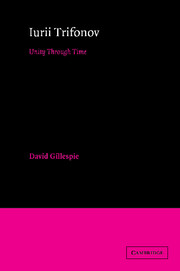Book contents
- Frontmatter
- Contents
- Preface
- Introduction
- 1 From Moscow students to the Turkmenian desert (Studenty; Utolenie zhazhdy)
- 2 Moscow life, 1966–1975 (Obmen; Predvaritel'nye itogi; Beskonechnye igry; Dolgoe proshchanie; Drugaia zhizn')
- 3 The house on the embankment (Dom na naberezhnoi)
- 4 Terrorism, Civil War and the present (Neterpenie; Otblesk kostra; Starik)
- 5 Time and place (Vremia i mesto; Ischeznovenie)
- Conclusion: unity through dislocation (Oprokinutyi dom)
- Notes
- Bibliography
- Index
- CAMBRIDGE STUDIES IN RUSSIAN LITERATURE
2 - Moscow life, 1966–1975 (Obmen; Predvaritel'nye itogi; Beskonechnye igry; Dolgoe proshchanie; Drugaia zhizn')
Published online by Cambridge University Press: 22 August 2009
- Frontmatter
- Contents
- Preface
- Introduction
- 1 From Moscow students to the Turkmenian desert (Studenty; Utolenie zhazhdy)
- 2 Moscow life, 1966–1975 (Obmen; Predvaritel'nye itogi; Beskonechnye igry; Dolgoe proshchanie; Drugaia zhizn')
- 3 The house on the embankment (Dom na naberezhnoi)
- 4 Terrorism, Civil War and the present (Neterpenie; Otblesk kostra; Starik)
- 5 Time and place (Vremia i mesto; Ischeznovenie)
- Conclusion: unity through dislocation (Oprokinutyi dom)
- Notes
- Bibliography
- Index
- CAMBRIDGE STUDIES IN RUSSIAN LITERATURE
Summary
At the end of 1966 Trifonov published two short stories in Novyi mir, his first publication in that journal since Studenty. Trifonov's return to Novyi mir, the flagship of the liberal intelligentsia, coincided with the onset of the conservative backlash against Khrushchev's de-Stalinization of the 1950s and early 1960s. Also in 1966, the trial of Siniavskii and Daniel' for publishing supposedly ‘anti-Soviet’ works in the West under pseudonyms was, notwithstanding Stalin's terror, the first trial against Soviet writers in which ‘the principal evidence against them was their literary work’. Once more Trifonov bore witness to a change in the political and cultural climate: as the Brezhnev regime was consolidated, so there was a return to ‘old’ ways of thinking, and liberalism and democratic tendencies in the arts were actively discouraged. The decade had begun as a time of hope and increased freedom with the Twentieth Party Congress and the publication of One Day in the Life of Ivan Denisovich; it was to end with the jailing of more dissidents, the dismissal of Tvardovskii as editor of Novyi mir and the expulsion of Solzhenitsyn from the Writers' Union.
Nevertheless, there were publications that reflected the struggle of ‘old’ and ‘new’ ways of thinking.
- Type
- Chapter
- Information
- Iurii TrifonovUnity through Time, pp. 47 - 98Publisher: Cambridge University PressPrint publication year: 1993



